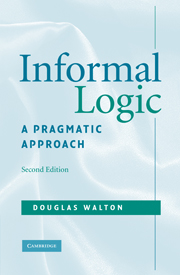Book contents
- Frontmatter
- Contents
- Preface
- Acknowledgments
- Informal Logic
- 1 Argument as reasoned dialogue
- 2 Questions and answers in dialogue
- 3 Criticisms of irrelevance
- 4 Appeals to emotion
- 5 Valid arguments
- 6 Personal attack in argumentation
- 7 Appeals to authority
- 8 Inductive errors, bias, and fallacies
- 9 Natural language argumentation
- Bibliography
- Index
6 - Personal attack in argumentation
Published online by Cambridge University Press: 05 June 2012
- Frontmatter
- Contents
- Preface
- Acknowledgments
- Informal Logic
- 1 Argument as reasoned dialogue
- 2 Questions and answers in dialogue
- 3 Criticisms of irrelevance
- 4 Appeals to emotion
- 5 Valid arguments
- 6 Personal attack in argumentation
- 7 Appeals to authority
- 8 Inductive errors, bias, and fallacies
- 9 Natural language argumentation
- Bibliography
- Index
Summary
The argumentum ad hominem, meaning “argument directed to the man,” is the kind of argument that criticizes another argument by criticizing the arguer rather than his argument. Basically, this type of argument is the type of personal attack of an arguer that brings the attacked individual's personal circumstances, trustworthiness, or character into question. The argumentum ad hominem is not always fallacious, for in some instances questions of personal conduct, character, motives, etc., are legitimate and relevant to the issue. However, personal attack is inherently dangerous and emotional in argument, and is rightly associated with fallacies and deceptive tactics of argumentation. Three basic categories of fallacy have often traditionally been associated with three types of argumentum ad hominem.
The abusive ad hominem argument is the direct attack on a person in argument, including the questioning or vilification of the character, motives, or trustworthiness of the person. Characteristically, the focus of the personal attack is on bad moral character generally, or bad character for truthfulness.
The circumstantial ad hominem argument is the questioning or criticizing of the personal circumstances of an arguer, allegedly revealed, for example, in his actions, affiliations, or previous commitments, by citing an alleged inconsistency between his argument and these circumstances. The charge, “You don't practise what you preach!” characteristically expresses the thrust of the circumstantial ad hominem argument against a person.
- Type
- Chapter
- Information
- Informal LogicA Pragmatic Approach, pp. 170 - 208Publisher: Cambridge University PressPrint publication year: 2008



